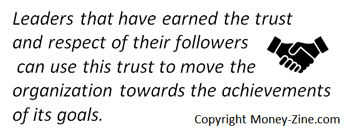A discussion of the characteristics of a leader is an interesting topic, since people often wonder if they are true leaders. This article will review those characteristics that are most commonly found in leaders, providing insights into how someone might measure up against this standard.
Characteristics of a Leader
Listed below are a total of eight leadership characteristics that we believe help to define a leader today. The word "skill" is used many times in the paragraphs below. That's because for many individuals becoming an effective leader requires practice to develop that skill.
Interpersonal Skills
| Additional Resources |
| Leadership QualitiesLeadership Traits Leadership SkillLeadership Skills Assessment |
Leaders that have earned the trust and respect of their followers can use this trust to move the organization towards the achievements of its goals. They're able to use their interpersonal skills to work through difficult relationships, and keep the peace in their departments. These individuals are good at listening as well as providing constructive feedback.
Communication Skills
Leaders demonstrating communication skills are both good speakers and listeners. Through their words they can help keep the workforce motivated and committed. They also listen to their followers, and ask questions when they want to make sure they have a good understanding of what is being expressed.
Values
It's also important to value the diversity of a workforce, and understand that a diverse group of employees will bring a broader perspective to the organization. Good leaders will treat followers with the respect they deserve, and do not display favoritism. They operate with a high level of ethics, which becomes an example for others to follow.
Organizational Consciousness
Characteristics can sometimes go beyond personal traits, and touch on areas such as organizational consciousness or knowledge. These are leaders that understand what the organization wants to achieve, and know how it can be accomplished. They create networks within the organization to help their groups get work done, and are just as adept at breaking down organizational barriers to progress.

Confidence
It's also important for leaders to carry themselves with confidence, and not be afraid to take ownership for both popular and unpopular decisions. They must be able to learn from criticisms, and are often acutely aware of their own shortcomings. Confident leaders are able to maintain a calm demeanor even during emergencies, and this can be contagious when it needs to be.
Flexibility
Another important characteristic of a leader is their ability to remain flexible, and adapt their style to meet the demands of the current work environment. They must be able to work with others to meet organizational goals, and shift focus as necessary.
Creativity Skills
When a leader demonstrates creativity skills they are able to develop innovative solutions to old problems. The diversity they build in their organizations helps them to develop more comprehensive answers to routine questions. Creative leaders are able to translate technical information into solutions that are understood by everyone.
Achieving Results
A true leader needs to do more than just set the example for others to follow; they also need to play a big role in achieving the goals of the organization. Through their skills, they maintain a high level of performance in their organizations, and they are able to help keep their workforce motivated even when faced with a seemingly impossible situation. Since they have a deep understanding of what an organization needs to accomplish, they are able to quickly identify and solve the important objectives of an organization.
Final Thoughts
This last point is an important one that often separates true leaders from the rest of an organization. Leadership is much more complex than merely earning a high-status position in a company, and the ability to give orders to subordinates. It is a participative journey the leader must be willing to walk with others. It's a skill that's acquired over a lifetime, and these characteristics are something that can be "practiced" just about every day. Keep in mind that great leaders are not born, they are made; they also make mistakes. But one thing that a great leader does very well is learn from their mistakes. Individuals that practice these characteristics and avoid repeating the same mistake no longer have to worry about being a leader. They know in their heart that they've become one already.
About the Author - Leadership Characteristics


